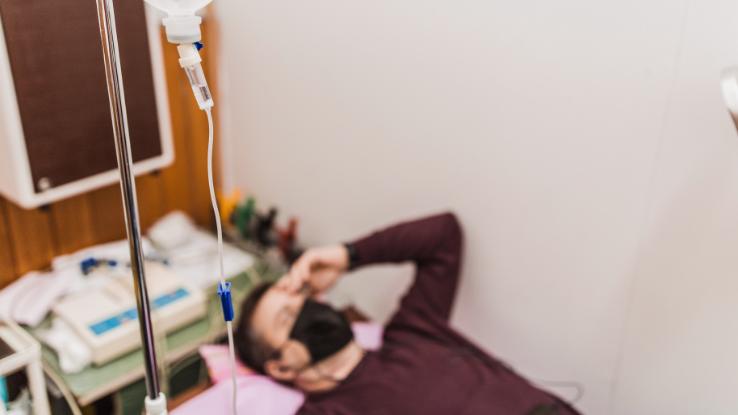
Approximately 60 percent of the human body is made up of water. Since our bodies lose fluids through natural processes, like urination and sweating, we must consistently replenish our fluids throughout the day. Maintaining a proper fluid balance in one’s body is vital for keeping up oxygen levels, maintaining electrolyte balance, supporting bone and joint health, aiding in digestion, and more.
Exercising, spending time in the sun, certain medications, or symptoms of illness (like fever, vomiting, or diarrhea) can all lead to dehydration if fluids are not replenished appropriately. Mild dehydration can be easily corrected, but severe dehydration is often life-threatening. Once significant dehydration sets in, the body slowly begins to shut down, eventually causing problems such as kidney failure, seizures, or brain swelling. Fortunately, your body will tell you that you’re dehydrated before you get to that stage, by displaying one or more of the following warning signs.
Dry Mouth
One of the earliest signs of dehydration is a dry mouth, which is caused by low saliva production. This is typically accompanied by dry or cracked lips, sticky or thick saliva, and difficulty swallowing. A dry mouth can be pretty uncomfortable and, oftentimes, it makes people want to drink water in order to alleviate the sensation.
Thirst
This may seem like an obvious symptom, but when you’re dehydrated, you become thirsty. This is your body’s way of urging you to increase its fluid levels. The best practice is to drink water prior to feeling thirsty, as thirst is actually a sign that mild dehydration has already set in.
Urine Color
By far, the best indicator of dehydration is the color of your urine. Urine should be clear or pale yellow. If it isn’t, that means you haven’t taken in enough fluids. So, what do other colorations indicate?
- Urine that’s a lighter, yellow color indicates mild dehydration.
- Urine that’s a darker color indicates severe dehydration.
All of this to say, if your urine isn’t clear, it’s time to pour yourself a glass of water.
Headache
Dehydration and associated electrolyte imbalances can lead to headaches. Typically, these are felt across one’s entire head, rather than being isolated to one side of the head (common with migraines) or to the front of the head (typical of sinus headaches). If you feel a headache coming on, especially in combination with other symptoms on this list, try drinking some water.
Poor Skin Turgor
Skin turgor refers to the elasticity of your skin. Normally, when you pinch your skin, it falls right back into place once you let go of it. But if you have poor skin turgor, your skin will be stiffer and take longer to fall back into place.
Trying the skin turgor test on the back of your hand is a good indicator of dehydration. In fact, it’s often used by healthcare professionals when assessing a patient for dehydration.
Fatigue
Fatigue is another common sign of dehydration, so if you feel tired after a workout or sluggish while working in the afternoon, it may be because you haven’t had enough to drink that day. Drinking water is a major source of oxygen for the body — and oxygen is vital to the body’s processes.
Irritability
If you find yourself feeling down or snapping at people around you without a clear reason, it may be because you’re dehydrated. In addition to hydrating properly to avoid dehydration-caused irritability, try eating something, too.
Difficulty Going to the Bathroom
Constipation and difficulty urinating are common symptoms of dehydration since the body needs adequate fluids to generate urine and support bowel movements. In children and adults, severe constipation or difficulty urinating means that one has gone eight or more hours without urinating. For infants, this means going three or more hours without a wet diaper. Cramps may also accompany these symptoms.
Flushed Skin
If you notice that your skin is slightly red, it may be because you’re dehydrated. However, if you’ve been exercising for a while or have spent some time in the sun, your skin may be flushed anyway, so be sure to look for other warning signs that accompany this symptom.
Dizziness & Difficulty Concentrating
Dizziness, lightheadedness and vertigo are all symptoms of severe dehydration. Usually, these symptoms are caused by a lack of blood flow to the brain. Severe dehydration can also cause confusion and/or make it difficult for one to concentrate. Once these symptoms have developed, it’s important to seek medical attention right away.
Nausea
When a person is nauseous, they usually don’t feel like ingesting anything, but when it comes to dehydration, ingesting fluids is a must. Nausea is another symptom of severe dehydration and may require medical attention. It’s also a common warning sign for pregnant people who are dehydrated.
Rapid Breathing
Just as a dog pants when it needs water, a human will begin to breathe rapidly when they are dehydrated. This is a compensatory response to increase the body’s oxygen levels — and it actually signifies severe dehydration. Rapid breathing may also be accompanied by an increased heart rate or drop in blood pressure.
Managing Dehydration
Treating dehydration involves taking in more fluids — primarily water. The key is to drink slowly; a rapid intake of fluids can induce vomiting, or exacerbate the other symptoms of dehydration. For severe dehydration, a hospital stay will most likely be needed in order to safely replenish fluid levels and avoid complications.

Although dehydration is likely to occur when you’re sick or spending time in the sun, it can be prevented rather easily. All you need to do? Watch for these warning signs that your body needs more water — and then drink plenty of fluids before dehydration sets in.
Resource Links:
- “The Water in You: Water and the Human Body” via USGS
- “Dehydration” via Cleveland Clinic
- “Dehydration” via National Health Service (NHS)
- “Dehydration” via Mayo Clinic
- “Dehydration” via MedlinePlus
- “Dry Mouth” via Mayo Clinic





